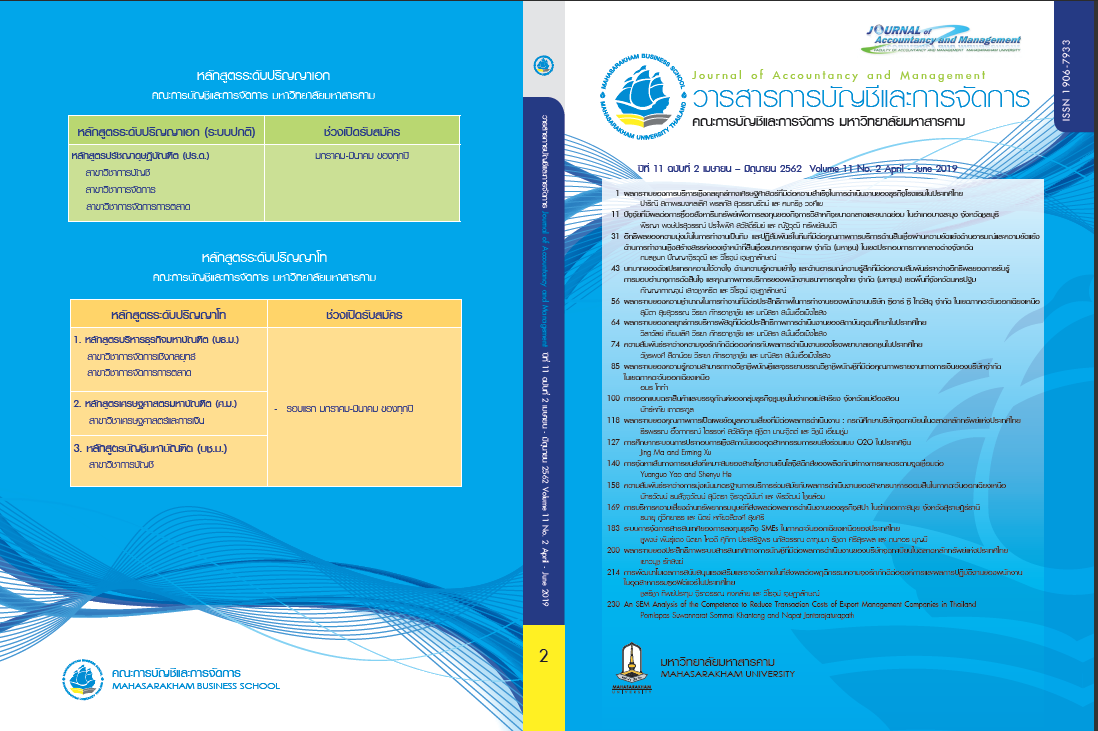การศึกษากระบวนการประกอบการเชิงสถาบันของอุตสาหกรรมการขนส่งร่วม แบบ O2O ในประเทศจีน
Main Article Content
บทคัดย่อ
งานวิจัยนี้ ศึกษากระบวนการประกอบการเชิงสถาบันของอุตสาหกรรมการขนส่งร่วมแบบ O2O ในประเทศจีนจากมุมมองของผู้ประกอบการเชิงสถาบันและตรรกะเชิงระบบที่หลากหลาย ตามกรอบการวิเคราะห์วาทกรรม พบว่า มีตรรกะเชิงระบบที่หลากหลายที่อยู่เบื้องหลังของอุตสาหกรรมการขนส่งร่วมแบบ O2O ในประเทศจีน ซึ่งแสดงให้เห็นการเปลี่ยนแปลงอย่างชัดเจนจาก ตรรกะแบบครอบครัวเป็นตรรกะแบบแบ่งปัน เช่น การเปลี่ยนแปลงในผลลัพธ์เชิงตรรกะเกี่ยวกับแนวคิดเชิงสถาบันใหม่ๆ และกฎหมายเกี่ยวกับการประกอบกิจการ
Downloads
Article Details
บทความที่ได้รับการตีพิมพ์เป็นลิขสิทธิ์ของวารสารการบัญชีและการจัดการ
ข้อความที่ปรากฏในบทความแต่ละเรื่องในวารสารวิชาการเล่มนี้เป็นความคิดเห็นส่วนตัวของผู้เขียนแต่ละท่านไม่เกี่ยวข้องกับมหาวิทยาลัยมหาสารคาม และคณาจารย์ท่านอื่นๆในมหาวิทยาลัยฯ แต่อย่างใด ความรับผิดชอบองค์ประกอบทั้งหมดของบทความแต่ละเรื่องเป็นของผู้เขียนแต่ละท่าน หากมีความผิดพลาดใดๆ ผู้เขียนแต่ละท่านจะรับผิดชอบบทความของตนเองแต่ผู้เดียว
เอกสารอ้างอิง
multi-dimensional similarity measurement. Decision Support Systems, 103, 1-8.
Thornton, P.H. & Ocasio, W. (1999). Institutional logics and the historical contingency of power in organizations:
Executive succession in the higher education publishing industry. American Journal of Sociology,
105(3), 801-844.
DiMaggio, P. (1997). Culture and Cognition. Annual Review of Sociology, 23, 263-287.
Julie Battilana, Bernard Leca, & Eva Boxenbaum. (2009). 2 how actors change institutions: towards a theory of
institutional entrepreneurship. Academy of Management Annals, 3(1), 65-107.
Khaire, M., & Wadhwani, R. (2010). Changing Landscapes: the Construction of Meaning and Value in a
New Market Category—modern Indian Art. The Academy of Management Journal, 53(6), 1281-1304.
Myeong-Gu Seo, & W. E. Douglas Creed. (2002). Institutional Contradictions, Praxis, and Institutional Change:
A Dialectical Perspective. The Academy of Management Review, 27(2), 222-247.
Fairclough, N. (2001). Language and power (2nd ed.).
Thornton, P. (2002). The Rise of the Corporation in a Craft Industry: Conflict and Conformity in Institutional Logics.
The Academy of Management Journal, 45(1), 81-101.
Thornton, P.H. (2012). The institutional logics perspective. , 15(5), 145-147.
Thornton, P.H. (2004). Markets from Culture: Institutional Logics and Organizational Decisions in Higher Education
Publishing.
Thornton, P.H. & Ocasio, W. (2012). Institutional Logics. The SAGE Handbook of Organizational Institutionalism.
Scott, W.R. (2001). Institutions and organizations. Cinema Journal,24(8), 469-470.
Maguire, S., Hardy, C. & Lawrence, T.B. (2004). Institutional entrepreneurship in emerging fields:
hiv/aids treatment advocacy in canada. Academy of Management Journal, 47(5), 657-679.
Suchman, M.C. (1995). Managing legitimacy: strategic and institutional approaches. Academy of Management Review,
20(3), 571-610.
Bin, X. & Xiaoli, G. (2013). Critical discourse analysis: Objective, Method and Status Quo. Foreign Languages and
Their Teaching, (4), 1-5.
Alvesson, M. & Deetz, S. (2000). Doing critical management research. London: Sage Publications.
Ruth, W. & Michael, M. (2001). Methods of Critical Discourse Analysis. London: Sage Publications.


